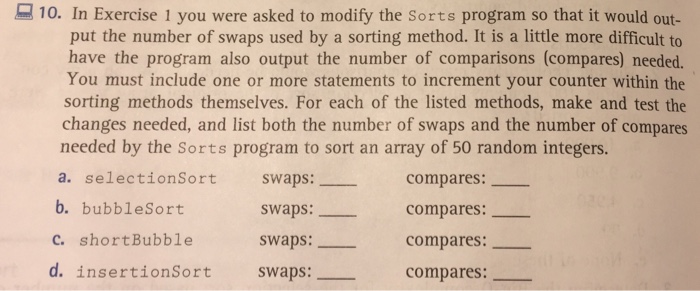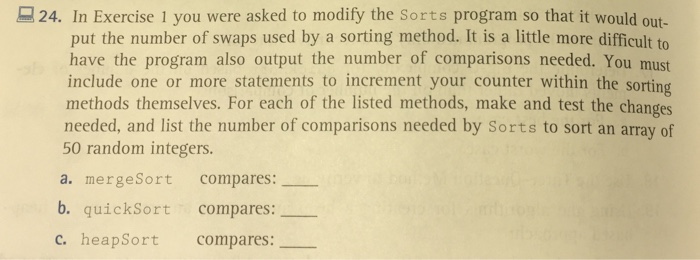Question
sorts.java //---------------------------------------------------------------------------- //Sorts.java by Dale/Joyce/Weems Chapter 10 // //Test harness used to run sorting algorithms. //---------------------------------------------------------------------------- import java.util.*; import java.text.DecimalFormat; public class Sorts { static


sorts.java
//----------------------------------------------------------------------------
//Sorts.java by Dale/Joyce/Weems Chapter 10
//
//Test harness used to run sorting algorithms.
//----------------------------------------------------------------------------
import java.util.*;
import java.text.DecimalFormat;
public class Sorts
{
static final int SIZE = 50; // size of array to be sorted
static int[] values = new int[SIZE]; // values to be sorted
static int swap = 0;
static int comparison = 0;
static void initValues()
// Initializes the values array with random integers from 0 to 99.
{
Random rand = new Random();
for (int index = 0; index
values[index] = Math.abs(rand.nextInt()) % 100;
}
static public boolean isSorted()
// Returns true if the array values are sorted and false otherwise.
{
boolean sorted = true;
for (int index = 0; index
if (values[index] > values[index + 1])
sorted = false;
return sorted;
}
static public void swap(int index1, int index2)
// Precondition: index1 and index2 are >= 0 and
//
// Swaps the integers at locations index1 and index2 of the values array.
{
swap++;
int temp = values[index1];
values[index1] = values[index2];
values[index2] = temp;
}
static public void printValues()
// Prints all the values integers.
{
int value;
DecimalFormat fmt = new DecimalFormat("00");
System.out.println("The values array is:");
for (int index = 0; index
{
value = values[index];
if (((index + 1) % 10) == 0)
System.out.println(fmt.format(value));
else
System.out.print(fmt.format(value) + " ");
}
System.out.println();
}
/////////////////////////////////////////////////////////////////
//
// Selection Sort
static int minIndex(int startIndex, int endIndex)
// Returns the index of the smallest value in
// values[startIndex]..values[endIndex].
{
int indexOfMin = startIndex;
for (int index = startIndex + 1; index
comparison++;
if (values[index]
indexOfMin = index;
}
return indexOfMin;
}
static void selectionSort()
// Sorts the values array using the selection sort algorithm.
{
int endIndex = SIZE - 1;
for (int current = 0; current
swap(current, minIndex(current, endIndex));
}
/////////////////////////////////////////////////////////////////
//
// Bubble Sort
static void bubbleUp(int startIndex, int endIndex)
// Switches adjacent pairs that are out of order
// between values[startIndex]..values[endIndex]
// beginning at values[endIndex].
{
for (int index = endIndex; index > startIndex; index--){
comparison++;
if (values[index]
swap(index, index - 1);
}
}
static void bubbleSort()
// Sorts the values array using the bubble sort algorithm.
{
int current = 0;
while (current
{
bubbleUp(current, SIZE - 1);
current++;
}
}
/////////////////////////////////////////////////////////////////
//
// Short Bubble Sort
static boolean bubbleUp2(int startIndex, int endIndex)
// Switches adjacent pairs that are out of order
// between values[startIndex]..values[endIndex]
// beginning at values[endIndex].
//
// Returns false if a swap was made; otherwise, returns true.
{
boolean sorted = true;
for (int index = endIndex; index > startIndex; index--){
comparison++;
if (values[index]
{
swap(index, index - 1);
sorted = false;
}
}
return sorted;
}
static void shortBubble()
// Sorts the values array using the bubble sort algorithm.
// The process stops as soon as values is sorted.
{
int current = 0;
boolean sorted = false;
while ((current
{
sorted = bubbleUp2(current, SIZE - 1);
current++;
}
}
/////////////////////////////////////////////////////////////////
//
// Insertion Sort
static void insertItem(int startIndex, int endIndex)
// Upon completion, values[0]..values[endIndex] are sorted.
{
boolean finished = false;
int current = endIndex;
boolean moreToSearch = true;
while (moreToSearch && !finished)
{
comparison++;
if (values[current]
{
swap(current, current - 1);
current--;
moreToSearch = (current != startIndex);
}
else
finished = true;
}
}
static void insertionSort()
// Sorts the values array using the insertion sort algorithm.
{
for (int count = 1; count
insertItem(0, count);
}
/////////////////////////////////////////////////////////////////
//
// Merge Sort
static void merge (int leftFirst, int leftLast, int rightFirst, int rightLast)
// Preconditions: values[leftFirst]..values[leftLast] are sorted.
// values[rightFirst]..values[rightLast] are sorted.
//
// Sorts values[leftFirst]..values[rightLast] by merging the two subarrays.
{
int[] tempArray = new int [SIZE];
int index = leftFirst;
int saveFirst = leftFirst; // to remember where to copy back
while ((leftFirst
{
comparison++;
if (values[leftFirst]
{
tempArray[index] = values[leftFirst];
leftFirst++;
}
else
{
tempArray[index] = values[rightFirst];
rightFirst++;
}
index++;
}
while (leftFirst
// Copy remaining items from left half.
{
tempArray[index] = values[leftFirst];
leftFirst++;
index++;
}
while (rightFirst
// Copy remaining items from right half.
{
tempArray[index] = values[rightFirst];
rightFirst++;
index++;
}
for (index = saveFirst; index
values[index] = tempArray[index];
}
static void mergeSort(int first, int last)
// Sorts the values array using the merge sort algorithm.
{
comparison++;
if (first
{
int middle = (first + last) / 2;
mergeSort(first, middle);
mergeSort(middle + 1, last);
merge(first, middle, middle + 1, last);
}
}
/////////////////////////////////////////////////////////////////
//
// Quick Sort
static int split(int first, int last)
{
int splitVal = values[first];
int saveF = first;
boolean onCorrectSide;
first++;
do
{
onCorrectSide = true;
while (onCorrectSide){ // move first toward last
comparison++;
if (values[first] > splitVal)
onCorrectSide = false;
else
{
first++;
onCorrectSide = (first
}
}
onCorrectSide = (first
while (onCorrectSide) { // move last toward first
comparison++;
if (values[last]
onCorrectSide = false;
else
{
last--;
onCorrectSide = (first
}
}
comparison++;
if (first
{
swap(first, last);
first++;
last--;
}
} while (first
swap(saveF, last);
return last;
}
static void quickSort(int first, int last)
{
comparison++;
if (first
{
int splitPoint;
splitPoint = split(first, last);
// values[first]..values[splitPoint - 1]
// values[splitPoint] = splitVal
// values[splitPoint+1]..values[last] > splitVal
quickSort(first, splitPoint - 1);
quickSort(splitPoint + 1, last);
}
}
/////////////////////////////////////////////////////////////////
//
// Heap Sort
static int newHole(int hole, int lastIndex, int item)
// If either child of hole is larger than item this returns the index
// of the larger child; otherwise it returns the index of hole.
{
int left = (hole * 2) + 1;
int right = (hole * 2) + 2;
comparison++;
if (left > lastIndex)
// hole has no children
return hole;
else{
comparison++;
if (left == lastIndex){
comparison++;
// hole has left child only
if (item
// item
return left;
else
// item >= left child
return hole;
}
else{
comparison++;
// hole has two children
if (values[left]
comparison++;
// left child
if (values[right]
// right child
return hole;
else
// item
return right;
}
else{
comparison++;
// left child >= right child
if (values[left]
// left child
return hole;
else
// item
return left;
}
}
}
}
static void reheapDown(int item, int root, int lastIndex)
// Precondition: Current root position is "empty".
//
// Inserts item into the tree and ensures shape and order properties.
{
int hole = root; // current index of hole
int newhole; // index where hole should move to
newhole = newHole(hole, lastIndex, item); // find next hole
while (newhole != hole)
{
values[hole] = values[newhole]; // move value up
hole = newhole; // move hole down
newhole = newHole(hole, lastIndex, item); // find next hole
}
values[hole] = item; // fill in the final hole
}
static void heapSort()
// Sorts the values array using the heap sort algorithm.
{
int index;
// Convert the array of values into a heap.
for (index = SIZE/2 - 1; index >= 0; index--)
reheapDown(values[index], index, SIZE - 1);
// Sort the array.
for (index = SIZE - 1; index >=1; index--)
{
swap(0, index);
reheapDown(values[0], 0, index - 1);
}
}
/////////////////////////////////////////////////////////////////
//
// Main
public static void main(String[] args)
{
initValues();
printValues();
System.out.println("values is sorted: " + isSorted());
System.out.println();
// make call to sorting method here (just remove //)
Sorts.comparison = 0;
Sorts.swap = 0;
selectionSort();
System.out.println("Number of comparisons: "+Sorts.comparison);
System.out.println("Number of swaps: "+Sorts.swap);
// reseting to zero
Sorts.comparison = 0;
Sorts.swap = 0;
// bubbleSort();
// shortBubble();
// insertionSort();
// mergeSort(0, SIZE - 1);
// quickSort(0, SIZE - 1);
// heapSort();
printValues();
System.out.println("values is sorted: " + isSorted());
System.out.println();
}
}
10. In Exercise 1 you were asked to modify the sorts program so that it would out- put the number of swaps used by a sorting method. It is a little more difficult to have the program also output the number of comparisons (compares) needed. You must include one or more statements to increment your counter within the sorting methods themselves. For each of the listed methods, make and test the changes needed, and list both the number of swaps and the number of compares needed by the Sorts program to sort an array of 50 random integers. a. selection Sort Swaps compares: b. bubbles ort Swaps compares c. short Bubble Swaps compares: d. insertions Swaps compares sortStep by Step Solution
There are 3 Steps involved in it
Step: 1

Get Instant Access to Expert-Tailored Solutions
See step-by-step solutions with expert insights and AI powered tools for academic success
Step: 2

Step: 3

Ace Your Homework with AI
Get the answers you need in no time with our AI-driven, step-by-step assistance
Get Started


